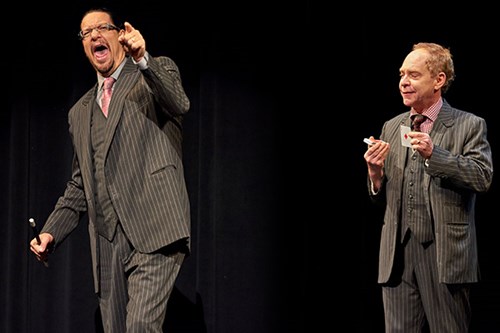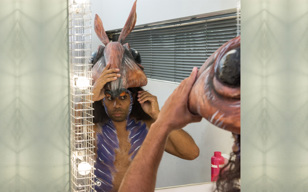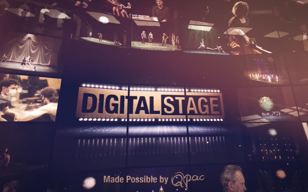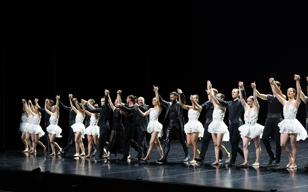Published: 21 February 2020
Story writer Phoebe Wowor secured an interview with Penn Jillette, one half of the world’s most famous magic acts – Penn & Teller.
When she discovered their conversation would take place just ahead of that night’s Las Vegas show, she imagined him roaring down Route 66 in a Cadillac wearing dark sunglasses with a levitating white rabbit in the backseat. But of course…
PW: YOUR AGENT MENTIONED YOU’D BE ON THE ROAD. THERE’S A HUGE PART OF ME THAT’S HOPING YOU’RE ON YOUR WAY TO VEGAS, DRIVING DOWN THE FREEWAY IN SOME SORT OF CONVERTIBLE. ARE YOU EN ROUTE TO THE SHOW?
PENN: [Laughs] In some sort of Trans Am with a big pile of money in the back seat?! No. I have arrived. I’m in the parking lot of a coffee place. I’m going to go in before I go pick up my children from school. I am in my car, but I am not moving.
PW: I’M GOING TO HIT YOU WITH A BIG QUESTION STRAIGHT UP. WHAT IS PARADISE TO YOU? A PLACE? A STATE OF MIND?
PENN: Well, actually, paradise is the road that runs parallel to the Las Vegas strip. Everything is deemed paradise in Las Vegas, both the name paradise, but also the pun of ‘pair of dice’. Both of those things pop up. I probably see the word paradise as a ‘pair of dice’ more than anyone else you’ve ever talked to. Everything here in our corner of the Mojave Desert is named paradise. It’s a very common name for roads and shopping malls and everything here.
PW: WHY IS THAT?
PENN: I think because they’re trying to make money, and people like the idea of paradise!
PW: WHAT ABOUT FOR YOU PENN? WHAT’S YOUR PARADISE?
PENN: I’ve been thinking a lot about this lately, the short stories I’ve been reading, and some stuff I’m working on. In tenth year of high school, my teacher asked, “If you had the choice to be happy all the time, would you make that choice?” Everybody of course in the class smelled that it was a trick question and said, “Well, no, I like to be excited!” and so on. I said, “Well yes”, and the teacher said, “But you need downs and ups, and happiness and sadness, to make your life full and end up happy”. I said “Yes, and what you guaranteed was happiness, so that should be included in your very question”. I argued about that and now, 50 years later I seem unable to let it go. I still want to keep that fight going.
Clearly the position is that joy can only be seen like light in the background of darkness. I find that for a rich and truly happy life, to live in paradise, you certainly need to have obstacles to overcome. I think paradise for me would be incredibly hard problems that didn’t hurt anyone else, but I would eventually be able to solve.

Welcome to Fabulous Las Vegas sign, Image Credit: iStock
PW: THAT IS A VERY GOOD SEGUE. 'THE NEW YORK TIMES' ONCE DESCRIBED YOU AND TELLER AS “A BRAZEN ASSAULT ON THE TEMPLE OF MAGIC”. WHY DID YOU DECIDE TO TREAD THE PATH LESS TRAVELLED IN THE INDUSTRY?
PENN: There was a thing written by an avant garde man in San Francisco called the Woztok Manifesto that said if you don’t like supermarket music, for Christ’s sake stop making supermarket music. If you’re going to start a rock ‘n’ roll band, you should come in disliking the Rolling Stones, shouldn’t you? You should find something else to do!
PW: THAT’S WHEN YOU HEADED INTO THE WORLD OF MAGIC?
PENN: I hated magic, I mean, really hated it. I thought that’s the idea of lying to people. I met Teller when I was 17 and Teller and I got into discussion through a mutual friend and Teller said that magic was essentially intellectual. It’s a little bit like somebody saying to me Donald Trump was intellectual, it seemed like an insane thing to say.
Teller pointed out that although in music and the other forms of theatre performance, you have the strong visceral sense, in magic you need to understand things before you can be amazed. People will enjoy that a little bit more as they get older.
Teller also said that he felt that magic could be done honestly. At the time we were talking about this magic was Doug Henning and David Copperfield, it was like a greasy guy in a tux and a lot of birds, torturing women and I really hated that. Teller and I wanted to come up with everything that Teller loved about magic and not do the things I didn’t like about magic.
Many years have passed since those conversations and I now love, love, love magic, but I still dislike the parts of it that were all magic to me when we first got into it. The idea of studying how we ascertained what was truth, what was real in an honest way, is fascinating to me.
Whenever a magician comes up and goes, “You know if I had real magical powers this is what I’d do”. All I want to ever say is, “Mother fucker, cure AIDS”. If you have real magical powers let’s get rid of malaria, there’s a lot of starving children to deal with, there’s a lot of suffering, let’s get rid of that. We don’t give a fuck that you want to float a woman in the air.
My thinking is magic is beautiful and wonderful because you know there’s deception. It’s why the word trick is so beautiful to me, and the word illusion is so ugly.

Penn & Teller, Photographer: Francis George
PW: WHY DO YOU THINK PEOPLE WANT TO BELIEVE IN MAGIC?
PENN: I don’t think they really do. I think that it’s a shortcut for something else that they’re saying. Like Christopher Hitchens – who I think is one of the greatest writers of all time – used to say that when people said they wanted to believe in God he would always respond it’s a little bit like wanting to live in North Korea. I think when people say they want to believe in magic they want to believe in a very specific kind of sloppy thinking of magic. If we actually had powers that took away the rules of physics or the rules of the universe, I believe all fun goes away. The only fun we have in life is the fun of discovery, the fun of new experiences, the fun of ‘aha’, and the fact that we have these rules built in that gives us something to think about and play with and enjoy and gives us, albeit possibly an illusion of, free will.
“Everybody around our neighbourhood in Vegas know where Penn and Teller do their work, that they go to coffee places to sit in and they know we’re working on bits.”
PW: CAN YOU DEFINE THE MAGIC BETWEEN YOU AND TELLER?
PENN: Teller and I have really a purely intellectual relationship. You talk about teams that have worked before, whether you’re talking about Martin and Lewis or Lennon and McCartney who were of course known all over the world. Those relationships, as a matter of fact, most of your artistic partnerships, start out with affection, start out with love. I think it’s very, very clear that Lennon and McCartney were head over heels in love with one another, so when they no longer got along it was heartbreaking.
Teller and I did not have any sort of huge affection. Our relationship, when we first met, would have been the same if it was sent in letters. There was no sense of wanting to be around each other, we just wanted to talk to each other and get ideas together.
Teller and I set out really, with the total purpose of our relationship, to explore intellectual theatrical ideas. Within that we’ve had a fairly stormy relationship artistically. We argue about every second of every show, but it’s a very, very businesslike and polite relationship, personally and emotionally.
In 44 years neither one of us has ever even threatened to quit. In 44 years we have never had a drink of alcohol or any drug. In 44 years I can say, not literally but essentially, neither one of us has ever been late for a meeting, never fucked up a show. We are very, very reliable. The combination of being personally reliable and having the same morals or work ethic, and views about money, morality, religion and ethics, coupled with very different views of art, gives you what I was talking about earlier, which is paradise.
PW: TO BE HONEST, YOU DON’T HEAR THAT A LOT IN THIS INDUSTRY!
PENN: No, and I must say this because my daughter gets very angry if I don’t… Teller is my BFF.
When my children were born he was the first one to meet them, after my wife and I of course, and the doctors. When our parents died they were the first ones we talked to. All of that kind of stuff is of course very, very important and we are best friends. But in terms of socialising, almost never. The exception of course is when we’re writing, we needed a coffee place, a Starbucks or something, and then we’ll sit there together. Everybody around our neighbourhood in Vegas know where Penn and Teller do their work, that they go to coffee places to sit in and they know we’re working on bits.
PW: YOU’RE WORLD FAMOUS FOR BREAKING BOUNDARIES. IS THERE SOMEONE OUT THERE THAT YOU ADMIRE FOR THE SAME REASON?
PENN: There’s a kind of person who is a fan, and I am a fan. When I decide that I’m interested in the work that someone’s doing, I follow everything they do. I have been a very, very hard core fan of Bob Dylan from the time I was 12 right up until now at 64. There’s nothing that Bob Dylan’s recorded that I haven’t heard.
Then there are the people that I like politically: Ayaan Hirsi Ali, the African Dutch freedom fighter writer, she’s always a big inspiration to me. My favourite writers are Nelson Baker and Melville… I am crazy for Melville and Moby Dick. I am always reading Moby Dick. I finish it and I start it again, that’s what I do.
PW: I HAVE THAT SAME RELATIONSHIP WITH JANE AUSTEN AND 'PRIDE AND PREJUDICE'. I DO THAT EVERY SIX MONTHS.
PENN: You’ve got to have those books. In jazz, I listen to a lot of Miles Davis. Our mentor, who died last year, Johnny Thompson, who for 20 years worked with us in everything we did, the greatest magician of my lifetime, worked with us on everything, and he was certainly an inspiration, professionally, artistically, and personally. James Randi, The Amazing Randi, who I know has done a lot in Australia, for scepticism, he was an inspiration. Christopher Hitchens, my friend Richard Dawkins, for philosophy.
PW: YOU’RE PARTICULARLY FAMOUS IN AUSTRALIA AT THE MOMENT FOR YOUR SHOW 'FOOL US'. HARRY HOUDINI ONCE SAID, “NEVER TRY TO FOOL CHILDREN, THEY EXPECT NOTHING AND THEREFORE SEE EVERYTHING”. TRUE OR FALSE?
PENN: Absolutely true! This goes back to my point that magic becomes more enjoyable as you get older. To children, because there’s not the intellectual plot they see moment by moment, their intellect does not lead them astray. Richard Feynman, Nobel Prize winner, and who is a friend of ours… the people that we have done magic for who are brilliant tend to be very easy to fool. With Richard Feynman all you had to do was do the same trick two different ways and you fucked him sideways, he just could not accept the fact you would change the rules that way on him.
I think Houdini’s exactly right.
You May Also Like

Behind the Scenes
Our Behind the Scenes series takes you on an exclusive journey into the heart of QPAC, where the magic of the stage comes to life.

Projects and Events
QPAC is a creative hub where communities come together to celebrate, learn, and grow through the transformative power of the arts.

Digital Stage
On-demand performances, live streams and behind-the-scenes.

Support
Support QPAC to help nurture and celebrate Queensland's rich artistic heritage while fostering innovation and creativity for the future.


